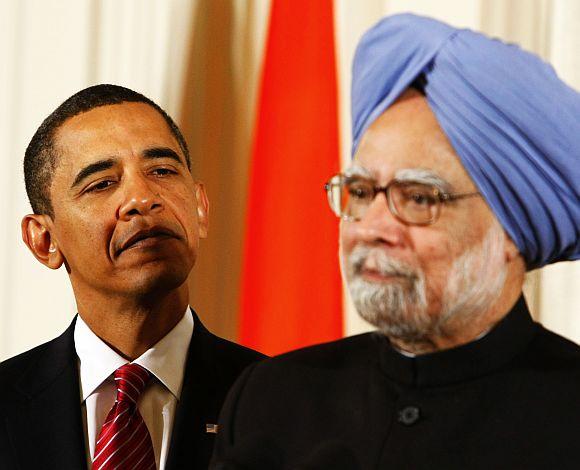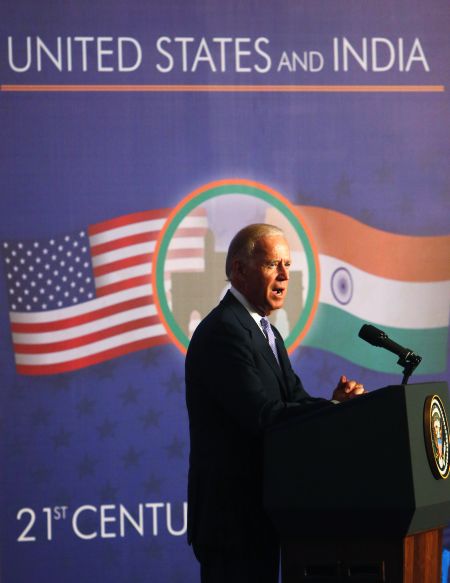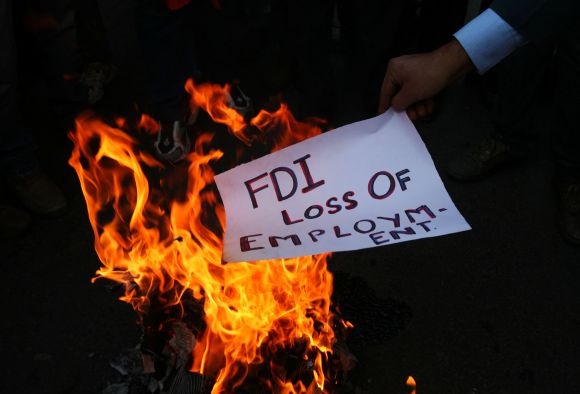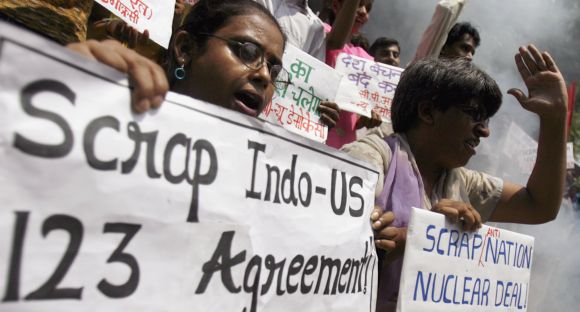Photographs: Larry Downing/Reuters Harsh V Pant
The United States-India relationship stands at a serious inflection point. The two sides need to start thinking seriously about bringing it back on track, notes Harsh V Pant.
It has now been confirmed that before going to New York to participate in the United Nations General Assembly deliberations in New York, Prime Minister Manmohan Singh will be visiting Washington, DC, in September for his second bilateral engagement with US President Barack Obama.
Though New Delhi was very keen on the visit and the US President had extended an invitation to Singh earlier this year, it’s not entirely clear what a lame-duck prime minister is likely to achieve during this visit. That US-India ties have hit a plateau has been evident from the lacklustre engagements between the two sides in recent months.
Please …
'These are difficult times for the US-India bilateral relationship'
Image: US Vice President Joe Biden addresses a gathering at the Bombay Stock Exchange during his visit to India last monthPhotographs: Vivek Prakash/Reuters
It was the turn of US Vice President, Joseph Biden, a month after Secretary of State John Kerry’s visit to India, to reassure New Delhi over Washington’s keenness on a robust partnership with India.
Biden’s four day visit to India last month, first for a US vice-president in three decades, was aimed at laying the groundwork for the Indian prime minister’s visit to the US in September.
Though it was clear from the very beginning that Biden’s trip will not result in any ‘deliverables’, it also remains a mystery as to what an Indian prime minister -- at the fag end of his term and with hardly any political capital left -- will be able to do to galvanise this very important relationship with a perfunctory visit to the US.
These are difficult times for the US-India bilateral relationship which has been flagging for quite some time now and there is little likelihood of it gaining momentum anytime soon. The growing differences between the two countries today are not limited to one or two areas but are spread across most areas of bilateral concern.
These include market access issues, the problems in implementing the US-India civil nuclear accord, the US immigration changes, changing US posture towards Afghanistan, defence cooperation and trade.
Biden’s visit was specifically focused on trying to give a push to economic ties, enhancing cooperation on defence issues, pushing India for a greater role in the Asia-Pacific and addressing climate change.
That the US is clearly concerned about Indian economic slowdown was reflected in Biden’s comments. He exhorted New Delhi to try to take bilateral trade with the US to $500 billion (about Rs 30,39,500 crore) by removing trade barriers and inconsistencies in the tax regime. He recommended more measures like recent relaxation in the foreign direct investment rules by underlining “caps in FDI, inconsistent tax system, barriers to market access, civil nuclear cooperation, bilateral investment treaty and policies protecting investment.”
Please …
'US getting increasingly frustrated with India's lackadaisical policy'
Image: Activists protest in Mumbai against central government's move to bring in FDI in multi-brand retail.Photographs: Punit Paranjpe/Reuters
Investor confidence in the Indian economy, Asia’s third largest, is at an all time low with growth slowing down to its lowest level in a decade. Foreign direct investment slid about 21 per cent to $36.9 billion (about Rs 2,24,315 crore) last fiscal year compared with 2011-12.
The US is keen to see India remove investment caps in sectors including finance, retail and insurance. The US corporate sector has been up in arms in recent months about India’s trade policies, complaining that American firms are being discriminated against and the US intellectual property rights are being undermined by India.
Sporadic outbursts of reform measures from New Delhi have not been enough to restore investor confidence in India even as Indian policy-makers are now busy trying to secure their votes for the next elections. Policy-making in India remains paralysed and haphazard with Washington getting increasingly frustrated with the Indian government’s lackadaisical public policy.
For his part, Biden went out of his way to assuage the concerns of the Indian corporate sector by suggesting that Washington plans to increase the number of temporary visas and green cards to highly skilled workers from India. The concerns, however, continue to persist because the US Senate has already cleared the much-talked-about immigration bill that will significantly restrict Indian IT companies in the US. If the House of Representatives ends up endorsing it, then the Obama administration will have to do some heavy lifting to mollify India.
Please …
'Need serious thinking to bring the relationship back on track'
Image: CPI-ML activists protest against the India-US nuclear agreement in New DelhiPhotographs: Adnan Abidi/Reuters
Meanwhile, the civil nuclear deal is floundering as the US companies remain wary of Indian laws on compensation claims in the event of a nuclear accident. India’s nuclear liability law is aimed at ensuring that foreign companies operating in Indian nuclear sector assume nearly unlimited liability for accidents, a condition that all but precludes the participation of US firms. After all the political and diplomatic investment that Washington made in making the nuclear deal happen, there is a pervading sense in the US that the returns have not been at all impressive.
On climate change where the Obama administration is focusing significantly, Biden pushed India to work with the US to reduce flow of hydroflurocarbons and provide opportunities to the scientific establishment to work on green technology options. The US is already working with China on a joint effort to curb greenhouse gases.
Biden also tried to ease Indian concerns on Afghanistan by underlining that the Taliban would have to give up ties with Al Qaeda and accept the Afghan constitution as part of the reconciliation process. New Delhi remains concerned about the impact of US withdrawal from Afghanistan for Indian security. The recent bombing outside the Indian consulate in Jalalabad merely highlights the challenges India faces in Afghanistan.
According to Biden, “there are no obvious places where Indian interests and American interests diverge worldwide, regionally or domestically.” That may well be true but in an absence of a big idea to push the relationship forward strategically, the tactical issues where there are significant differences between Washington and New Delhi continue to shape the trajectory of the US-India bilateral ties.
The relationship stands at a serious inflection point. The two sides need to start thinking seriously about bringing it back on track. New Delhi, in particular, needs to acknowledge the importance of what Biden suggested when he said that “there is no contradiction between strategic autonomy and strategic partnership.”
In the name of ‘strategic autonomy’ New Delhi has become quite adept at scuttling its own rise. At this moment of significant geo-strategic flux in the Indo-Pacific, India and the US need each other like no other time in the past. Biden’s visit has underlined India’s importance in US strategic calculus. It is now for India to decide what role it sees for the US in its foreign policy matrix and as a corollary what role it sees for itself in the rapidly changing global order.





article